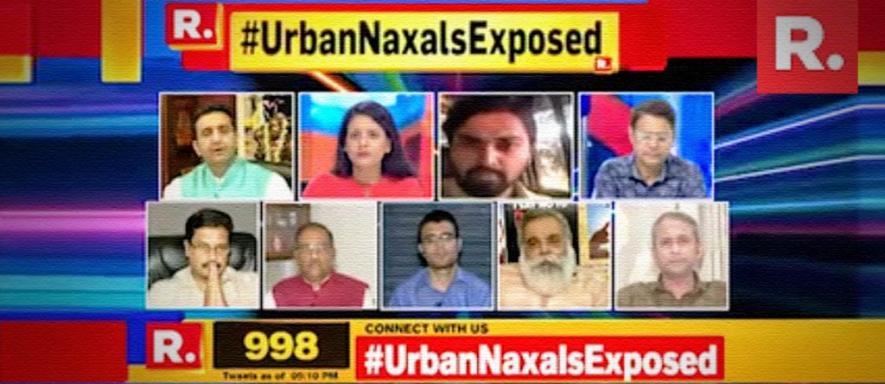Trial By Media: Pune Police Read Out 'Evidence' Not Yet Proved In Court

Image Courtesy: Countercurrents
In an interesting turn of events, the Pune Police participated in the media trial of the five activists whose transfer remand had been stayed by the Supreme Court of India. On Sunday, in front of television cameras, the Additional Director General of Maharashtra Police, Param Bir Singh, read out the content of a letter allegedly linking all the five activists to a plot ranging from assassination to waging a war against the State. The police has already faced flak following the flashy arrests on September 29, which were replete with energetic camera crews trying to catch a glimpse of these 'urban naxals'. Voices of protest have emerged from all quarters, including political parties, that have been at the receiving end of these activists' fight for human rights.
Also read: #MeTooUrbanNaxal: From Divide and Rule to Divert and Rule
Following the televised drama of the letter, Sudha Bhardwaj issued a statement through her lawyer. In her statement she called the letter “totally concocted” and “fabricated to criminalize me and other human rights lawyers, activists and organisations.” She further stated that “I have never given Rs. 50,000/- to hold any programme in Moga. Nor do I know any “Ankit from Maharashtra” or “Com. Ankit” who is in touch with Kashmiri separatists.” She then reiterated that “this is a fabricated letter. Which I had refuted when it was flashed on Republic TV on 4th July, and which has not even been brought before either the Pune Court nor [the Chief Judicial Magistrate] Faridabad while seeking to whisk me away to Pune.”
Also read: Arrest of Activists, Ploy to Divert Attention from Sanatan Sanstha?
Under sections 45 and 45A of the Evidence Act, 1872, the court can call for a technical 'expert' to aid in determining the facts for them. Section 45A allows for the opinion of the Examiner of Electronic Evidence, who is appointed by the Union Government under section 79A of the Information Technology Act, 2000. Section 46 makes it clear that, facts that are otherwise not relevant become relevant if they either corroborate or contradict the expert opinion. Section 65B(2) lays down the conditions for proving the veracity of an electronic record. Hence, it is clear that the law prescribes a lengthy process to determine whether a document or electronic record is relevant or not.
Had the police only levelled allegations through the press meet it would still have had a semblance of professional integrity. However, presenting a piece of alleged evidence that has not been tested in a court would lead one to believe that they are trying to make this into a media trial. The big question that arises is why would a professional force reveal a so-called key piece of evidence before the investigation was complete?
The police have alleged that they had found password protected soft copies of the letters seized on June 6, when they arrested activists Surendra Gadling, Rona Wilson, Sudhir Dhawale, Shoma Sen and Mahesh Raut. When a search and seizure takes place and a seizure report has been drawn, it contains a detailed list of the items seized. However, when seizure reports list laptops and other electronic items, the contents of these items are not recorded. This aspect of the procedural law is one of the main reasons that even electronic records have to be proved in court. Merely proving its existence will not suffice in proving its origin and its holder.
One reason why the police felt the need to read out the alleged letter in the press meet could be that the police felt they had to justify their actions to the public. If this were the case, why did the police not present this information to the Delhi High Court as well as the High Court of Punjab and Haryana after they stayed Gautam Navlakha and Sudha Bhardwaj's transfer remand orders respectively? The police could have also presented this 'evidence' to the Supreme Court when the matter went before it on August 29. Therefore, it would not be unwarranted to term this act of reading out the alleged 'letter' by the Additional Director General of Police as an attempt to influence public opinion.
Also read: Urban Naxalism: A Garb to Suppress Dissent and Resistance?
What is interesting is that one of the alleged letters written by the cryptic 'Comrade Prakash' to 'Surendra' states that, “Congress leaders are very much willing to assist in this process and have also agreed fund further agitations whenever such opportunities arrive.” If one were to consider the opinion polls, the present government is losing its popularity. One of the key reasons the Bharatiya Janata Party (BJP) swept the polls in 2014 was the corruption of the Congress-led United Progressive Alliance (UPA) government. Thus, it would make sense to implicate the Congress in a new scandal even if they are not in power. Considering these public facts: the government is losing popularity; the activists have continuously opposed various governments' policies; and that the main opposition party is also being implicated, one has every reason to be suspicious of the veracity of the letter, let alone its claims.
Read more: UAPA: Vague Definitions and Sweeping Powers
Get the latest reports & analysis with people's perspective on Protests, movements & deep analytical videos, discussions of the current affairs in your Telegram app. Subscribe to NewsClick's Telegram channel & get Real-Time updates on stories, as they get published on our website.























